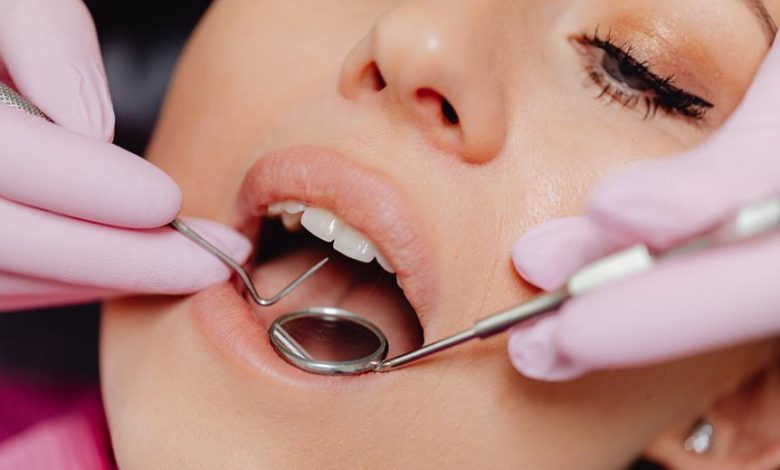Unveiling the Secrets of General and Cosmetic Dentistry

Did you know that maintaining good oral health can improve your overall well-being? In this informative article, we delve into the fascinating world of dentistry, specifically focusing on the secrets behind general and cosmetic dentistry. From preventive care and restorative procedures to enhancing your smile, we explore the comprehensive services provided by dentists. Join us on this enlightening journey as we uncover the importance of oral health and the strategies to achieve a healthy and beautiful smile.
Key Takeaways
- General dentistry focuses on preventing, diagnosing, and treating oral health issues for patients of all ages.
- Cosmetic dentistry specializes in improving the appearance of teeth and gums, but can also perform restorative treatments.
- Regular checkups and professional cleanings every six months are essential for maintaining oral health.
- Contact information for the dental clinic is provided, including a form on the website and email and phone contact details.
General Dentistry Services
General dentistry services encompass a wide range of oral health treatments and procedures aimed at preventing, diagnosing, and treating various dental issues for patients of all ages. One of the primary goals of general dentistry is to prevent oral diseases and maintain oral hygiene. This is achieved through regular checkups, examinations, and professional cleanings. Dentists play an essential role in preventing tooth decay and disease by providing preventative services such as teeth cleanings, oral cancer screenings, and cavity treatments. Additionally, they offer restorative procedures to address toothaches, cracked or broken teeth, and bleeding gums. By creating a customized treatment plan, dentists help patients maintain their oral health and prevent future dental problems. Regular visits to a general dentist every six months are recommended to ensure optimal oral hygiene and overall well-being.
Importance of Regular Checkups
During regular checkups, dentists assess the overall oral health of their patients and provide preventative treatments to maintain optimal dental hygiene. These checkups play a crucial role in preventing tooth decay and maintaining oral health. Here are three reasons why regular checkups are important:
- Early detection of dental issues: Regular checkups allow dentists to identify any signs of dental problems such as cavities, gum disease, or oral cancer at an early stage. This early detection enables prompt treatment, preventing further complications and costly procedures.
- Professional cleaning: Regular cleanings performed by dental professionals help remove plaque and tartar buildup, reducing the risk of tooth decay and gum disease. This ensures that your teeth and gums stay healthy and free from infection.
- Personalized oral health advice: Dentists provide valuable advice on oral hygiene practices, diet, and lifestyle habits that can help you maintain good oral health between checkups. This guidance is tailored to your specific needs, ensuring that you have the knowledge and tools to take care of your teeth and gums effectively.
Restorative Procedures and Disease Treatments
Restorative procedures and disease treatments encompass a wide range of interventions aimed at addressing oral health issues and restoring the function and aesthetics of the affected teeth and gums. Restorative treatments focus on repairing damaged or decayed teeth, such as fillings, crowns, and dental implants. These procedures not only restore the appearance of the teeth but also improve their functionality. Additionally, restorative dentistry plays a crucial role in oral disease management. It involves the diagnosis and treatment of conditions like gum disease, tooth decay, and oral infections. By providing appropriate treatments, such as root canal therapy and periodontal treatments, restorative dentistry helps manage and prevent the progression of these oral diseases. Overall, restorative procedures and disease treatments are essential for maintaining optimal oral health and preserving the natural function and beauty of the teeth and gums.
Cosmetic Dentistry: Enhancing Your Smile
Cosmetic dentistry offers a wide range of treatments and procedures to enhance and transform your smile. Whether you're looking for a complete smile makeover or simply want to improve your dental aesthetics, cosmetic dentistry has solutions for you. Here are three key ways cosmetic dentistry can enhance your smile:
- Teeth whitening: Brighten your smile by removing stains and discoloration from your teeth, giving you a more youthful and vibrant appearance.
- Dental veneers: These thin shells are custom-made to cover the front surface of your teeth, correcting issues such as chips, cracks, and gaps, and creating a more symmetrical and uniform smile.
- Invisalign: This clear aligner system helps straighten misaligned teeth discreetly and effectively, providing you with a straighter and more confident smile.
The Benefits of Cosmetic Treatments
One of the key benefits of cosmetic treatments is the enhancement they provide to one's overall appearance and self-esteem. Cosmetic dentistry procedures can correct various dental issues, such as misaligned teeth, discoloration, chips, and gaps, resulting in a more attractive smile. These treatments can have a significant impact on an individual's self-confidence and social interactions.
Moreover, cosmetic dentistry offers long-term benefits for oral health. For example, dental implants not only restore a missing tooth but also prevent bone loss and maintain the health of neighboring teeth. Additionally, procedures like dental bonding and veneers can strengthen weakened teeth and protect them from further damage.
While the cost of cosmetic treatments can vary depending on the specific procedure and individual case, the long-term benefits and improved quality of life make them a worthwhile investment. It is important to consult with a cosmetic dentist to discuss treatment options and cost considerations.
For a visual representation of the benefits of cosmetic dentistry, refer to the table below:
| Cosmetic Treatment | Enhancement | Long-Term Benefits |
|---|---|---|
| Teeth Whitening | Brightens and removes stains | Restores confidence |
| Dental Veneers | Corrects chips and gaps | Strengthens weakened teeth |
| Dental Implants | Replaces missing teeth | Prevents bone loss |
| Orthodontic Treatment | Straightens misaligned teeth | Improves oral health |
Transforming Your Smile With Cosmetic Dentistry
To achieve a radiant and confident smile, consider exploring the transformative possibilities offered by cosmetic dentistry. Cosmetic dental procedures can completely transform the look of your mouth and help you achieve a picture-perfect smile. Here are three ways cosmetic dentistry can enhance your smile:
- Teeth Whitening: Cosmetic dentists can brighten faded or stained teeth, restoring their natural whiteness and enhancing your smile's appearance.
- Dental Veneers: Veneers are thin shells made of porcelain or composite resin that are bonded to the front surface of your teeth. They can correct misaligned teeth, repair chips or gaps, and give you a flawless smile.
- Dental Implants: Missing teeth can be replaced with dental implants, which are surgically placed into the jawbone. Implants not only restore the appearance of your smile but also improve your overall oral health.
Contact Information for Dental Care Clinic
The contact information for the dental care clinic can be found on their website or by contacting their front desk. To get in touch with the clinic, you can fill out a form on their website, which requires your name, email, and phone number. Additionally, there is an option to include any questions or comments you may have. If you prefer direct communication, you can reach them via email at [email protected] or by calling 416-766-2853. It is also mentioned that the website provides social media sharing options to spread the word about the clinic. Ensuring website accessibility, the importance of enabling Javascript is emphasized. Overall, the clinic offers multiple channels of contact to cater to different preferences and needs.
Sharing on Social Media Platforms
Social media platforms offer a valuable opportunity to share information and engage with a wider audience in the field of dentistry. Maximizing social media presence can greatly benefit dental practices by increasing visibility, attracting new patients, and establishing credibility. To effectively share dental content on social media, here are some strategies to consider:
- Create engaging and educational content: Share informative posts, tips, and interesting facts about general and cosmetic dentistry to capture the attention of your audience.
- Utilize visual content: Incorporate eye-catching images, videos, and infographics to make your posts more visually appealing and shareable.
- Encourage interaction and feedback: Ask questions, start discussions, and respond to comments to foster engagement and build relationships with your followers.
Ensuring Website Accessibility for All Users
Website accessibility is crucial for providing an inclusive online experience to users of all abilities. Ensuring website accessibility for disabled users is not only a legal requirement but also a moral obligation. Improving user experience with website design can greatly benefit individuals with disabilities, allowing them to navigate and interact with the website effectively. When designing a website, it is important to consider factors such as screen reader compatibility, keyboard navigation, and alternative text for images. Implementing accessible design practices can make a significant difference in the user experience for individuals with disabilities. Providing clear and concise content, using proper heading structures, and offering adjustable font sizes are also important considerations. By prioritizing website accessibility, businesses can create a welcoming and inclusive environment for all users.
Frequently Asked Questions
What Are the Common Causes of Tooth Decay and How Can It Be Prevented?
Tooth decay, also known as dental caries, is a common oral health issue caused by the erosion of tooth enamel due to bacterial activity. The most common causes of tooth decay include poor oral hygiene, a diet high in sugary and acidic foods, frequent snacking, dry mouth, and certain medical conditions. Preventive measures to combat tooth decay include regular brushing and flossing, consuming a balanced diet, avoiding sugary drinks and snacks, and visiting the dentist for regular check-ups and cleanings.
Are There Any Risks or Complications Associated With Restorative Procedures?
Restorative procedures, such as dental implants, can have associated risks and complications. While these procedures are generally safe, there is a potential for complications such as infection, nerve damage, or implant failure. However, with proper planning, skilled execution, and adherence to post-operative care instructions, these risks can be minimized. It is important for patients to discuss potential risks and complications with their dentist before undergoing any restorative procedure to make an informed decision and ensure the best possible outcome.
How Long Does It Take to See Noticeable Results From Cosmetic Treatments?
Visible changes from cosmetic treatments can vary depending on the specific procedure and individual factors. Some treatments, such as teeth whitening, can show noticeable results immediately or within a few days. Other procedures, like orthodontic treatments or dental veneers, may require several weeks or months to see the desired outcome. It is important to consult with a cosmetic dentist to discuss the expected time frame for visible results based on the chosen treatment.
Can Cosmetic Dentistry Treatments Be Covered by Dental Insurance?
Coverage for cosmetic dentistry treatments can vary depending on the dental insurance plan. While some plans may provide partial coverage for certain cosmetic procedures, others may have limitations or exclusions. It is important to thoroughly review the insurance policy and consult with the insurance provider to understand what cosmetic treatments may be covered. Factors such as medical necessity and the specific procedure being performed can also affect coverage.
What Are the Potential Side Effects or Risks of Dental Implants?
Potential complications and risks of dental implants include infection at the implant site, damage to surrounding teeth or blood vessels, nerve damage, and sinus problems. However, these complications are rare and can be minimized with proper surgical technique and post-operative care. Long-term success of dental implants depends on factors such as oral hygiene, overall health, and proper maintenance. Regular dental check-ups and following the dentist's instructions can help ensure the success and longevity of dental implants.



